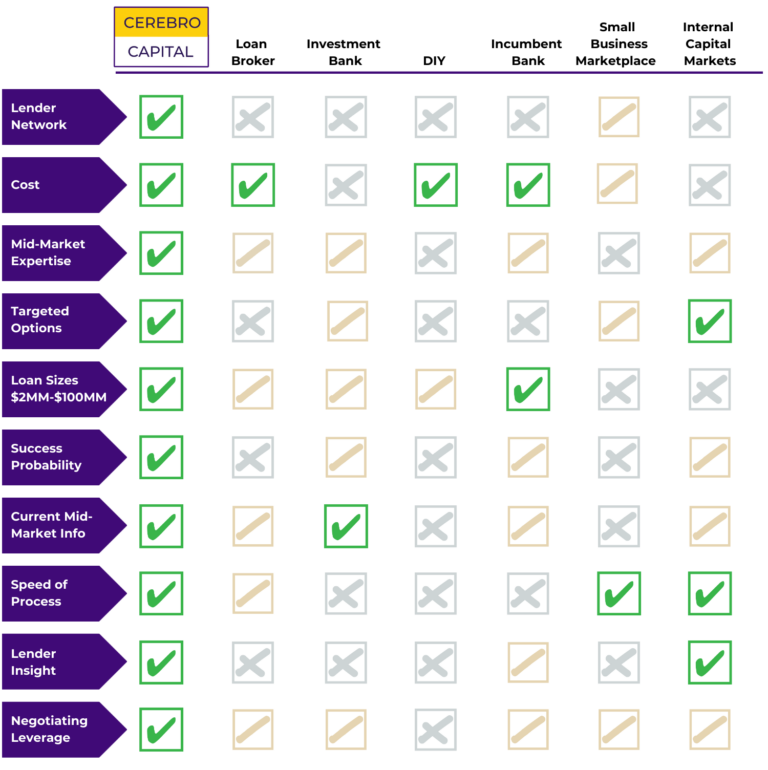BLOG
7 Ways to Get Debt Financing for Your Business: Comparing Your Options


Matthew Bjonerud
Founder & CEO
Does your business have ongoing efforts to raise capital? If so, it’s essential to be well-informed about the paths you can take to explore debt capital options for your mid-sized business. Each option has distinct characteristics and it is crucial to assess your options before committing to a specific path.

Let’s highlight some common financing options you will see you can make informed decisions that align with your business objectives and financial strategies:
Loan Brokers
Whether you are a lending expert or not, you are likely familiar with loan brokers. Loan brokers connect their borrower clients to lenders in their network, so they do not have to reach out and deal with individual lenders directly.
Pros:
- Convenience. Loan brokers connect borrowers to lenders they have established relationships with. The borrower does not have to reach out and deal with individual lenders directly, which saves them time and resources.
- Cost-Effective: Compared to alternative financing options, like hiring a Capital Markets team, working with a loan broker can be cost-effective option.
Cons:
- Small Lender Network: Loan brokers typically have a lender network of only five or so “go-to” lenders, limiting their access to a broader range of loan options to offer borrowers.
- Reduced Negotiating Leverage: When working with loan brokers, borrowers will notice they lack negotiating leverage due to the limited number of lenders in the broker’s network, many times resulting in less favorable terms.
- Single Individual Vs. Expert Team: Relying on a single loan broker can lead to delays in communication and responsiveness, as brokers have multiple clients they are working with at one time and limited manpower.
- Limited Mid-Market Perspective: Loan brokers may lack real-time, mid-market market data and insights because they tend to obtain this information only on a case-by-case basis from their small lender network. This limits their perspectives of the broader mid-market.
- Missed Opportunities: Loan brokers only put your business loan request in front of a select few lenders, which most likely will result in missed opportunities for tailored lending options and loan sizes that align with your unique needs.:
Investment Bank
An investment bank offers mid-market borrowers specialized services that include underwriting, facilitating M&As, asset management, and financial consulting. These financial institutions plays a key role in capital markets needs and financial transactions for mid-market businesses.
Pros:
- Financial Expertise: Investment banks have expertise in many aspects of the business lending process. When working with investment banks, borrowers will receive strategic lending advice, which in turn helps facilitate tailored capital raises for borrowers.
- Suite of Services: Investment banks can offer borrowers more than one type of service to ensure their financing needs are met and their specific lending situation is addressed.
Cons:
- High Cost: Investment banks typically have high cost structures that include both monthly retainers and banker fees.
- Limited Lender Network: Investment banks may have specialized divisions, but they often lack a vast lender network. This limits business financing options available to borrowers.
- More Suitable for Upper Mid-Market: Typically investment banks offer loan sizes $50 million and above. This not only skews their mid-market insights, but also makes target loan options limited for the lower to middle mid-market.
- Lack of Options and Negotiating Leverage: Investment banks typically offer only a few lending/loan choices at a time, while providing lending feedback periodically. This lack of choices and lender feedback leads to limited negotiating leverage and an overall slower funding process.
DIY
Embarking on a do-it-yourself (DIY) lending journey requires both patience and resilience. Managing your financing process alone entails a significant investment of time and resources.
Pros:
- Cost-Effective: The financial cost of a DIY approach is low since you are only working for/with yourself, not external experts who would charge for the value and expertise they provide.
- Freedom to Explore Options: DIY lending allows you the freedom to explore any financing options you’d like, without restrictions. Specific capital providers, like loan brokers for example, provide financing options limited to their lending arsenal, network, and expertise.
Cons:
- Time-Consuming: Handling the process of securing financing alone demands a significant investment of your time and resources that could be best allocated elsewhere. You are reaching out to individual lenders one by one, each setback with a lender requires restarting the entire process over again. Unideal if the need for capital is crucial.
- Lack of Expert Guidance: Unless you are a Capital Markets expert, the absence of expert guidance will make it challenging to identify optimal loan options, especially when it comes to rates and terms.
- No Lender Network: With a DIY lending approach, you are not going to have access to a lender network. You will miss out on exploring multiple options at once, gathering valuable lender feedback, and gaining negotiating leverage for better rates & terms.
- Hindered Funding Success: Funding success is solely contingent upon your ability to navigate the lending process by yourself. If you cannot give a major portion of your own time to the process, funding success is unlikely.
Incumbent Bank
Incumbent banks are traditional banking institutions that have offered lending options to businesses for quite some time. Businesses looking to work with incumbent banks are looking for a reliable institution with a long-standing presence in the financial mid-market.
Pros:
- Lower Cost: Compared to alternative options, working with an incumbent banks is relatively low-cost.
- Direct Lending: Incumbent banks provide lending products directly to borrowers instead of being the middle man. This is ideal for borrowers who rather deal with lenders directly.
- Loan Amounts Fit Mid-Market: Incumbent banks offer loans within the range of $2 million to $100 million, encompassing the broader mid-market.
Cons:
- No Lender Network: Since incumbent banks directly offer lending products to their borrowers, they lack an extensive lender network. Limits loan options for borrowers.
- Uncertain Mid-Market Expertise: The mid-market expertise and insight of incumbent banks varies, creating uncertainty about whether they possess the necessary knowledge for securing optimal rates and terms.
- Restrictions: Incumbent banks have restrictive standards and opaque lending criteria.
- Slow Process: Working with an incumbent bank is likely to be a slower process as there’s no dedicated team of experts to expedite requests.
- Confined Lender Insight: The lender insight provided by incumbent banks is confined to their specific lending products and portfolio, offering minimal negotiating leverage for mid-market businesses.
Small Business Lender Marketplace
A lender marketplace is an online platform that connects borrowers with multiple lenders, allowing borrowers to efficiently compare various loan options. Technological advancements have profoundly impacted various industries, including small business financial lending services. The mid-market, however, has been left in the dust.
Pros:
- Strong Lender Network: These marketplaces feature a strong network of lenders, providing borrowers with a variety of loan options.
- Team of Experts: The presence of a helpful team of small business experts can assist specific borrowers in navigating the lending process.
- Powerful Technology: The use of powerful technology allows for real-time market data which makes comparing loan options fast and efficient.
Cons:
- Small Business Loans: They cater to small businesses seeking loans under $2 million, leaving mid-market businesses underserved.
- Market Restrictions: Targeted options and market insights provided by these marketplaces are confined to small businesses and only relevant to the market they serve.
- Small Business Expertise: The lending insight is exclusively based on lenders servicing small businesses, making mid-market expertise unavailable.
- Limited Negotiating Leverage: While negotiating leverage remains strong, it is specific to the small business market, limiting effectiveness for mid-market loan requests.
Internal Capital Markets
An internal team of Capital Markets experts will strategically assist their business in capital raise efforts by analyzing market trends, economic conditions, and financial data to make informed decisions about the timing and structure of financial transactions.
Pros:
- Team of Experts: Internal Capital Markets teams are experts. They offer strategic advantages by analyzing and recommending the best loan options tailored to their business’ specific needs.
- Hands-Off Approach: An internal Capital Markets team will approach and handle lenders individually, allowing for a more hands-off approach for business decision makers.
- Tailored Options and Insights: The team’s specialized expertise can facilitate more informed negotiations and help their business explore tailored financing options effectively.
- Expedited Funding Process: Internal Capital Markets teams can use their expertise to expedite the funding process.
Cons:
- High Cost: Hiring and maintaining an internal Capital Markets team is very expensive.
- Limited Lender Network: While some personal contacts may exist amongst the team, their lender network is limited compared to other alternatives like an online lending marketplace.
- Small Team Size: Due to the high cost, internal Capital Markets teams are likely to be small, limiting their capacity to compare multiple financing options at one time.
- Upper Mid-Market Focus: The team’s expertise and cost structure make them more suitable for businesses in the upper mid-market seeking $100 million or more in financing, potentially excluding mid-market businesses seeking loans anywhere from $2 million to $100 million.
Why Cerebro is Different
Cerebro provides a perfect solution for mid-sized businesses looking to raise capital. We help our customers quickly secure debt financing with a combination of our data-driven lending marketplace and experts with years of experience. Here’s how Cerebro is different:
Tech-Enabled Financing: Cerebro Capital pairs cutting-edge, tech-enabled financing solutions with a team of experts to provide tailored loan options for mid-market businesses.
- Proven Data-Driven Matching: Utilizing a patented, data-driven lender matching approach we have successfully assisted our customers in securing loans ranging from $2 million to $100+ million.
Vast Lender Network: We have a vast network of 2,200+ top commercial banks and non-bank institutions, offering a diverse range of financing and lender options for mid-sized businesses across all industries.
Experienced Capital Markets Team: Our Capital Markets team, with over 100 years of combined expertise, means you will always be partnering with an expert that will guide you to the best loan options for your specific needs.
Tailored Loan Options: Working with us means receiving personalized loan options aligned with your unique business needs, so you can compare multiple loan options, term sheets, and lender feedback all in one place.
Non-Exclusive Services: Enjoy flexibility in negotiations with existing lenders as our services are non-exclusive, allowing you to gain negotiation leverage and explore various financing possibilities.
Real-Time Data and Intelligence: We have access to the latest mid-market information through real-time data and marketplace intelligence, sourced from $5.6 billion in committed loan proposals.
Efficient Application Process: Our fast and streamlined process allows you to submit a loan request in just 15 minutes, with document upload launching the matching process within 24-48 hours.
Quick Funding Timeline: Expect potential funding within 60-90 days, as lenders review and issue term sheets within 1 to 3 weeks after the initial document upload.
Long-Term Partnership: Our Capital Markets team becomes your long-term partner, whether you seek one business loan, multiple loans, or refinancing we are here every step of the way.
Related Content

The world of middle-market lending has changed. Before COVID-19, traditional lenders showed flexibility as they worked to expand their books of business.

Increase the Chances of Closing a Loan
Significant disruptions to the lending landscape in the past four months have left corporate borrowers scrambling to stay on top of changing requirements

CFOs need to be constantly aware of how their company’s financial performance and market shifts affect its debt capacity, which is the best measure of your business’ ability to borrow.
Ready to get started?
Join the thousands of mid-sized companies who have used Cerebro.
- info@cerebrocapital.com
-
12 W Madison St.
Baltimore, MD 21201 - Cerebro Capital
- @cerebrocapital
